




French Spoken Here
These days it seems to me that the phrase “How are you?” is used as much as part of a greeting as it is in a genuine enquiry. There is no particular expectation of a response, and even less so of a detailed discussion of one’s woes and ailments. That was quite handy for me when, in my final year at primary school, I learnt a few very basic words of French. We were taught, “Bonjour comment ça va ça va bien merci un deux trois quatre cinq,” all recited like times tables without pause to take a breath. I don’t seriously believe that our teacher knew what he was saying, and neither did we.
By contrast, the pupils in RLW are faring more successfully in their language journey. These children have already proved themselves to be champion linguists, having emerged victorious from Madame Baldwin’s Lower School language challenge last term. To win, they strove to incorporate Spanish into every aspect of their daily classroom routine, such as doing the register, standing up, sitting down, and lining up ‘en silencio’. This term, we are learning French in school, and the pupils are learning how to respond to the question “How are you?”, with the additional option of being fair to middling or even not so good.
In their previous lesson, RLW learnt how to say “Bonjour” and “Bon après-midi”, as well as the important matter of referring to teachers correctly as Monsieur or Madame, so today, as a recap, they started off by singing the “Bonjour” song. The children enjoy singing along with this, quickly picking up “Bonjour” and “Merci”, and even some other words and phrases as yet unknown to them.
One of these phrases is “Comment ça va?” Sebastian said he was keen to learn this phrase so he would know what he was singing about. Clearly “Comment ça va?” is a question, but what does it mean. This was a very tricky problem for RLW, so Madame Baldwin gave the children a clue by saying the same phrase in Spanish: “¿Cómo estas?” Knowing that, Aarian was able to give her the answer straight away.
Now, how should we respond if someone says “Comment ça va?” Madame Baldwin played the “Bonjour” song again on the whiteboard to enable everyone to hear that the correct answer is “Très bien, merci.” To make this more memorable, she suggested that the children should accompany the words with a double thumbs up action and, hopefully, a friendly, smiley face.
But what about those days when things aren’t going so well? We all have them. As Sebastian was quick to point out, it would be terrible to be in France and to have to say you felt great when actually you felt awful, just because you hadn’t learnt the correct words. Madame Baldwin taught the children to say “Ça va mal”, with the thumbs down sign and a sad face. Alternatively, for a more equivocal response, they could say “Comme ci comme ça”, wiggling their thumbs up and down and trying their best to look noncommittal.
To reinforce this learning, the children sat in a circle and sang the “Bonjour” song again, this time passing around a cuddly toy. When the music stopped, everyone asked, “Comment ça va?” and the person holding the toy had to give their answer, with the appropriate gesture and facial expression. Daniel decided he was “Comme ci comme ça” but, when the music stopped and Mrs Way found herself holding the toy, she was quick to respond with “Très bien, merci.”
The children will go on to learn to ask each other what their names are and to respond appropriately. In the meantime, I shall be looking out for RLW around school, so I can ask them how their day is going, say “Bonjour” to them, and see if they ask about me.
If you would like to play the “Bonjour” song at home, there is a link to it below.